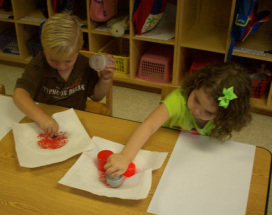We use the Conscious Discipline model for discipline. Conscious Discipline uses everyday conflict and life events to teach character development, social skills, conflict resolution and self-control. To be “good” with children, we watch each face and listen to each voice. We observe what each child is like, how each is feeling, how each child plays and moves around. We get to know the weaknesses and strengths of each child and of the group. This is how good discipline begins.
The word “discipline” is derived from the word “disciple,” someone who follows the teachings of another. Discipline means learning. It does not mean punishment, tears, or humiliation. It means a chance to learn how to live in a social world. Discipline is not something adults do to children. It is something they do with children.
The goals of discipline are self-control, responsibility, and self-discipline. Children need help in controlling their behavior. Most important, they need to become responsible for their own behavior and develop self-control.
Teachers WILL NOT humiliate or demean a child in any form, verbally or physically. Such actions will be cause for immediate dismissal. No punitive action toward children will be tolerated including slapping, hitting, and/or spanking. The return of negative behavior, such as biting back, is also not acceptable.
For more information about Conscious Discipline, you may visit www.consciousdiscipline.com. There you can find information on how Conscious Discipline works in the classroom as well as information and resources for parents to practice Conscious Discipline at home.
The word “discipline” is derived from the word “disciple,” someone who follows the teachings of another. Discipline means learning. It does not mean punishment, tears, or humiliation. It means a chance to learn how to live in a social world. Discipline is not something adults do to children. It is something they do with children.
The goals of discipline are self-control, responsibility, and self-discipline. Children need help in controlling their behavior. Most important, they need to become responsible for their own behavior and develop self-control.
Teachers WILL NOT humiliate or demean a child in any form, verbally or physically. Such actions will be cause for immediate dismissal. No punitive action toward children will be tolerated including slapping, hitting, and/or spanking. The return of negative behavior, such as biting back, is also not acceptable.
For more information about Conscious Discipline, you may visit www.consciousdiscipline.com. There you can find information on how Conscious Discipline works in the classroom as well as information and resources for parents to practice Conscious Discipline at home.
